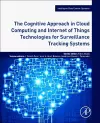
The Cognitive Approach in Cloud Computing and Internet of Things Technologies for Surveillance Tracking Systems
4 contributors - Paperback
£93.99
J. Dinesh Peter is Program Coordinator for the Department of Computer Sciences Technology at Karunya University, and author of more than 25 academic articles/chapters/conference papers. He has been active in government and industry as the developer of new technologies including Digital Image Processing, Virtual Reality Technology, Medical Image Processing, Computer Vision, and Optimization. He has been Guest Editor of a special issue of the Elsevier journal Computers and Electrical Engineering, and Guest Editor of special issues of the Journal of Cloud Computing and Journal of Big Data Intelligence. Dr. Peter received his Ph.D. in Computer Science and Engineering from National Institute of Technology Calicut, India. Dr. Amir H. Alavi is an Assistant Professor in the Department of Civil and Environmental Engineering, and holds a courtesy appointment in the Department of Bioengineering at the University of Pittsburgh. Prior to joining Pitt, Dr. Alavi was an Assistant Professor of Civil Engineering at the University of Missouri. Dr. Alavi’s research interests include structural health monitoring, smart civil infrastructure systems, deployment of advanced sensors, energy harvesting, and engineering information systems. At Pitt, his Intelligent Structural Monitoring and Response Testing (iSMaRT) Lab focuses on advancing the knowledge and technology required to create self-sustained and multifunctional sensing and monitoring systems that are enhanced by engineering system informatics. His research activities involve implementation of these smart systems in the fields of civil infrastructure, construction, aerospace, and biomedical engineering. Dr. Alavi has worked on research projects supported by Federal Highway Administration (FHWA), National Institutes of Health (NIH), National Science Foundation (NSF), Missouri DOT, and Michigan DOT. Dr. Alavi has authored five books and over 170 publications in archival journals, book chapters, and conference proceedings. He has received a number of award certificates for his journal articles. He is among the Google Scholar 200 Most Cited Authors in Civil Engineering, as well as Web of Science ESI's World Top 1% Scientific Minds. He has served as the editor/guest editor of several journals such as Sensors, Case Studies in Construction Material, Automation in Construction, Geoscience Frontiers, Smart Cities, ASCE-ASME Journal of Risk and Uncertainty in Engineering Systems, and Advances in Mechanical Engineering. Bahman Javadi is a Senior Lecturer in Networking and Cloud Computing at the Western Sydney University, Australia. Prior to this appointment, he was a Research Fellow at the University of Melbourne, Australia. From 2008 to 2010, he was a Postdoctoral Fellow at the INRIA Rhone-Alpes, France. He received his MS and PhD degrees in Computer Engineering from the Amirkabir University of Technology in 2001 and 2007, respectively. He has been a Research Scholar at the School of Engineering and Information Technology, Deakin University, Australia during his PhD course. He is co-founder of the Failure Trace Archive, which serves as a public repository of failure traces and algorithms for distributed systems. He has published more than 90 research papers and received numerous Best Paper Awards at IEEE/ACM conferences for his papers. He served as a program committee of many international conferences and workshops. His research interests include Cloud computing, performance evaluation of large scale distributed computing systems, and reliability and fault tolerance. He is a member of ACM and senior member of IEEE. Steven L. Ferandes is a post-doctoral researcher in the Department of Electrical and Computer Engineering, University of Alabama at Birmingham, and author of more than 35 academic articles/chapters/conference papers. He has been active in industry as the developer of new technologies including Socket Development for Validation of Standard Cll Automation Tool Used in Test Chip Design, Automation Framework for Web Services, Automation Framework for Mobile Applications (Android, iOS, Windows), Python programming for Computer Vision, Machine Learning, and Deep Learning. Dr. Fernandes received his Ph.D. in Computer Vision and Machine Learning from Karunya University, Coimbatore, India.